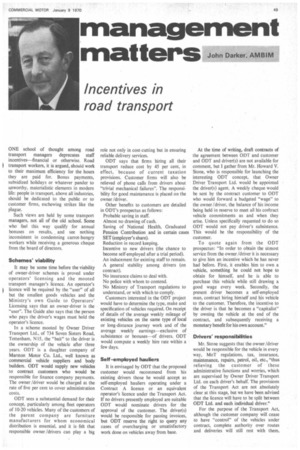management
Page 55

If you've noticed an error in this article please click here to report it so we can fix it.
matters John Darker, AMBIM
Incentives in road transport
ONE school of thought among road transport managers deprecates staff incentives—financial or otherwise. Road transport workers, it is argued, should work to their maximum efficiency for the hours they are paid for. Bonus payments, subsidized holidays or whatever pander to unworthy, materialistic elements in modern life: people in transport, above all industries, should he dedicated to the public or to customer firms, eschewing strikes like the Plague.
Such views are held by some transport managers, not all of the old school. Some who feel this way qualify for annual bonuses on results, , and see nothing inconsistent in condemning carrot-hungry workers while receiving a generous cheque from the board of directors.
Schemes' viability It may be some time before the viability of owner-driver schemes is proved under operators' licensing and the mooted transport manager's licence. An operator's licence will be required by the "user" of all but the smallest goods vehicles and the Ministry's own Guide to Operators' Licensing says that an owner-driver is the "user". The Guide also says that the person who pays the driver's wages must hold the operator's licence.
In a scheme mooted by Owner Driver Transport Ltd., of 734 Seven Sisters Road, Tottenham, NI5, the "bait" to the driver is the ownership of the vehicle after three years. ODT is a daughter company of Marston Motor Co. Ltd., well known as commercial vehicle suppliers and body builders. ODT would supply new vehicles to contract customers who would be responsible for finance company payments. The owner /driver would be charged at the rate of five per cent to cover administration costs.
ODT sees a substantial demand for their concept, particularly among fleet operators of 10-20 vehicles. Many of the customers of the parent company are furniture manufacturers for whom economical distribution is essential, and it is• felt that responsible owner /drivers can play a big role not only in cost-cutting but in ensuring reliable delivery services.
ODT says that firms hiring all their transport reduce cost by 45 per cent, in effect, because of current taxation provisions. Customer firms will also be relieved of phone calls from drivers about "trivial mechanical failures". The responsibility for good maintenance is placed on the owner /driver.
Other benefits to customers are detailed in ODT's prospectus as follows: Probable saving in staff.
Almost no drawing of cash.
Saving of National Health, Graduated Pension Contribution and in certain cases SET (employer's share).
Reduction in record keeping.
Incentive to new drivers (the chance to become self-employed after a trial period). An inducement for existing staff to remain. A general stability among drivers (on contract).
No insurance claims to deal with.
No police with whom to contend.
No Ministry of Transport regulations to understand, or with which to comply.
Customers interested in the ODT project would have to determine the type, make and specification of vehicles required. On receipt of details of the average weekly mileage of existing vehicles on the same type of local or long-distance journey work and of the average weekly earnings--exclusive of subsistence or bonuses—of drivers. ODT would compute a weekly hire rate within a few days.
Self-employed hauliers
It is envisaged by ODT that the proposed customer would recommend from his existing drivers those he would accept as self-employed hauliers operating under a Contract A licence or an equivalent operator's licence under the Transport Act. If no drivers presently employed are suitable ODT would nominate drivers for the approval of the customer. The driver(s) would be responsible for passing invoices, but ODT reserve the right to query any cases of overcharging or unsatisfactory work done on vehicles away from base. At the time of writing, draft contracts of the agreement between ODT and customer and ODT and driver(s) are not available for comment, but I gather from Mr. Howard V. Stone, who is responsible for launching the interesting ODT concept, that Owner Driver Transport Ltd. would be appointed the driver(s) agent. A weekly cheque would be sent by the contract customer to ODT who would forward a budgeted "wage" to the owner/driver, the balance of his income being held in reserve to meet all his codtract vehicle commitments as and when they arise. Unless specifically requested to do so ODT would not pay driver's subsistence. This would be the responsibility of the customer.
To quote again from the ODT prospectus: "In order to obtain the utmost service from the owner /driver it is necessary to give him an incentive which he has never had before. First, it enables him to own a vehicle, something he could not hope to obtain for himself, and he is able to purchase this vehicle while still drawing a good wage every week. Secondly, the present driver becomes a self-employed man, contract hiring himself and his vehicle to the customer. Therefore, the incentive to the driver is that he becomes a "capitalist" by owning the vehicle at the end of the contract, and subsequently receiving a monetary benefit for his own account."
Drivers' responsibilities Mr. Stone suggests that the owner /driver would be responsible for the vehicle in every way, MoT regulations, tax, insurance, maintenance, repairs, petrol, oil, etc., "thus relieving the customer of these administrative functions and worries, which are supervised by Owner Driver Transport Ltd. on each driver's behalf. The provisions of the Transport Act are not absolutely clear at this stage, but we have been advised that the licence will have to be split between ODT Ltd. and each individual driver."
For the purpose of the Transport Act, although the customer company will cease to have "control" of the vehicles under contract, complete authority over routes and deliveries will still rest with them,








































































































